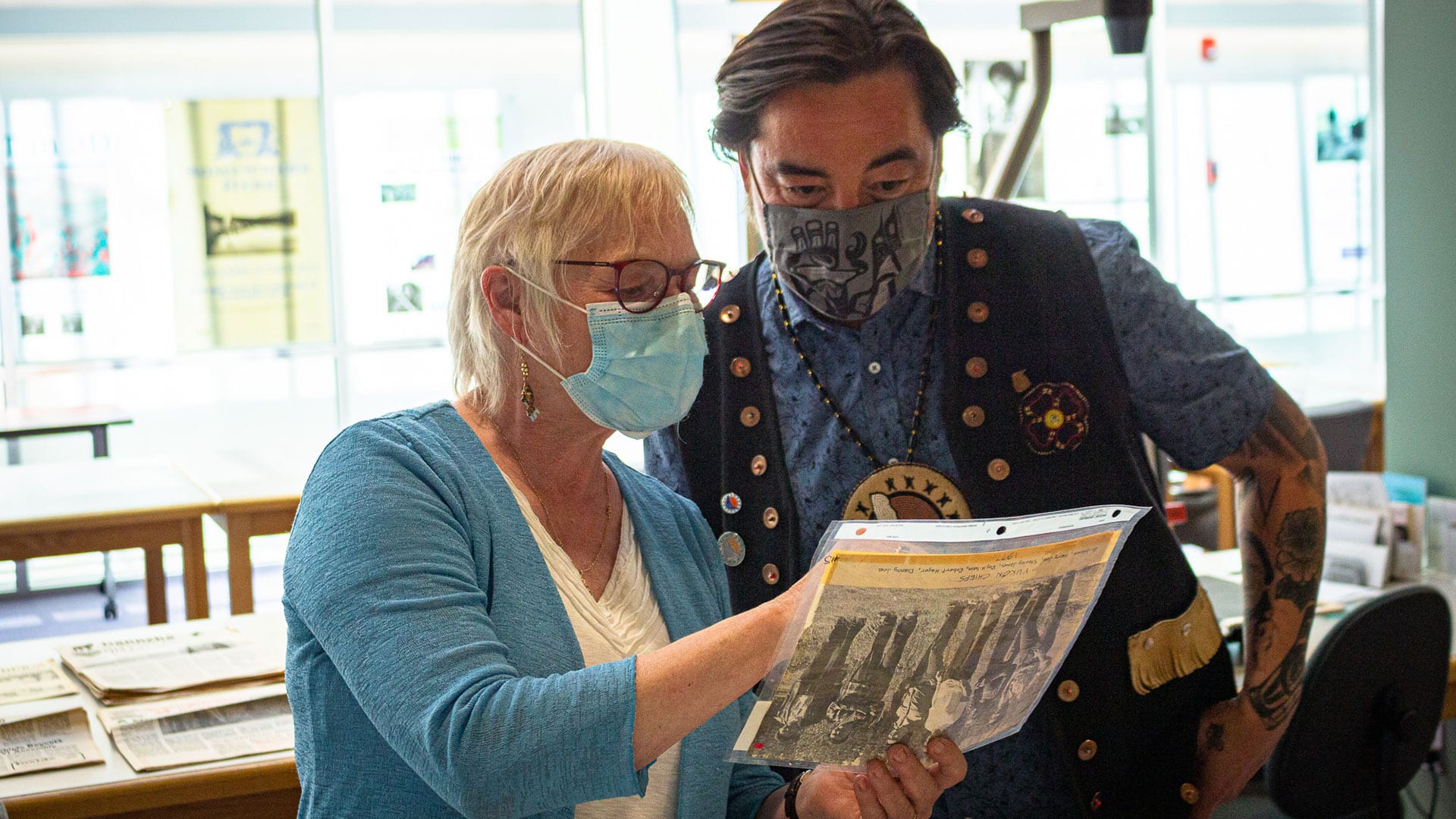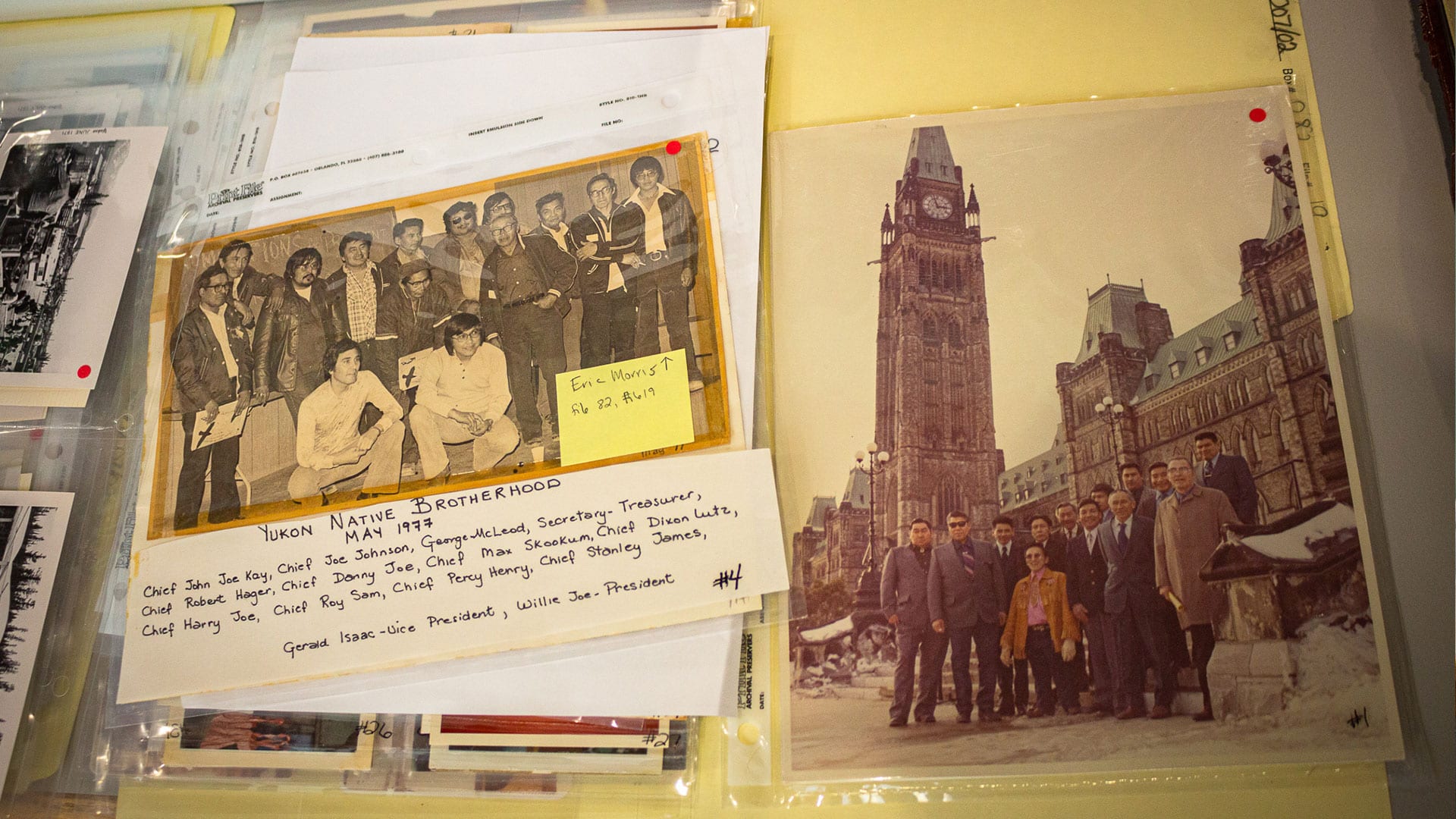Grand Chief Peter Johnston of the Council of Yukon First Nations (CYFN) is like a kid in a candy shop when it comes to the organization’s Archives Access Project.
Looking around a room at the Yukon Archives in Whitehorse where several old documents, photos, newspaper clippings and other archival material is spread throughout the room, he can’t stop himself commenting on everything in sight.
Pointing to a yellowed newspaper from the 1970s with a bold headline that reads ‘Three chiefs boycott first Council of Yukon Indians,’ he chuckles to himself.
“Huge news right?” he recalls. “Because they weren’t happy with where things were going.”
The archival items laid out for Grand Chief Johnston to view are just a small fraction of the thousands of materials that are part of the project.
The CYFN Archives Access Project is an archival project started in 2018 focusing on the appraisal, arrangement and creation of descriptions for around 2,000 boxes of unorganized records related to land claims, executive, environmental and governance matters of Yukon First Nations from the 1970s to 2010.
The boxes of materials include thousands of documents, photos, video and cassette tapes, audio recordings, film negatives and other items from earlier predecessor organizations.
Funded by the Library and Archives Canada’s Documentary Heritage Communities Program (DHCP), CYFN, and the Yukon Community Development Fund, the project’s ultimate goal is the make the materials available for public access (CI).
In May the project received around $52,000 from DHCP which is funding 41 heritage projects across Canada aimed at making them more accessible.
Johnston says what makes these materials so valuable is that Yukon First Nations were some of the first in Canada to settle their land claims.
Eleven of the Yukon’s 14 First Nations are now self-governing, representing almost half of all such agreements in Canada.
“It’s one of the most important projects of our history, not only the significance of the land claims and negotiation phases, but the whole time leading up to it,” he says.
Historic treasures in the collection include the original charter for the Yukon Native Brotherhood (YNB). The organization was instrumental in starting the Yukon land claims process by travelling to Ottawa and presenting Prime Minister Pierre Trudeau with the watershed policy paper “Together Today for Our Children Tomorrow” in 1973.
An original copy of The Umbrella Final Agreement, the overall agreement of the Yukon land claims package that was finalized in 1993, is also featured in the collection.
Grand Chief has personal connection

The project is also something close to Johnston’s heart.
Johnston’s father, Sam Johnston, was Chief of Teslin Indian Band from 1970 to 1984, now reconstituted as the self governing Teslin Tlingit Council , and he was part of the delegation that presented “Together Today…” to Trudeau.
Sam appears in a photo of the delegation during their trip to Ottawa.
“That’s my poppa, that’s my dad,” Johnston smiles.
Johnston has fond memories of growing up in the 1970s’ when land claims negotiations were charting history.
“I had the ability to be a part of the process going to General Assemblies, going to meetings at the old (Council for Yukon Indians) office, negotiations in Vancouver. I had the opportunity to be a part of the process,” he recalls.
His grandparents, David and Rose Johnston, were also heavily involved in the Teslin community and are featured on the front page of the Aug. 28, 1980 Yukon Indian News performing for a Yukon teachers orientation event.
“There’s my grandparents right there,” he chuckles. “That is so cool.”
Johnston says seeing his family in the collection is like travelling back through time.
“To see all our elders and ancestors and people who have passed on now come back to life through pictures, video and audio, and just to see the moment in time, the sacrifice, the dedication, the commitments – for me is everything.”
Project not an easy undertaking

In 2018 archivist Carey Isaak was hired by CYFN to process the boxes that are stored in a vault in the Yukon Archives building.
He says the boxes sat largely untouched and unorganized when they were moved from CYFN’s old building to the Yukon Archives’ vault in 1995.
“A lot of the boxes were wrapped in plastic still, and they were wrapped in plastic when they were transferred over here in 1995,” he says.
Isaak says after a year of cataloguing the boxes, he and other archivists working on the collection were able to identify a number of different content creators preceding CYFN: the Council for Yukon Indians, the Yukon Native Brotherhood, the Yukon Association for Non-Status Indians, Yukon Indian Women’s Society and the Yukon Indian Cultural Education Society.
He says it was not an easy undertaking – the Council for Yukon Indians alone had approximately 1,700 boxes.
From there, the records were organized into 16 separate series on categories like administration, economic development and education.
“Once we identify the series, now we have a base to work on, so this box belongs to education, this box belongs with communication, and so on” he says.
Isaak notes records relating to environment as he thought it would be of particular importance due to climate change issues affecting the Yukon.
The records are being identified, appraised, described and rehoused into preservation boxes and folders.
The latest 2021-2022 grant from DHCP will allow Isaak and project coordinator Linda Johnson to complete the final step of the project, which is to create finding aids so the records can be made available for research.
Project’s significance ‘worldwide’
Johnson says there’s immense interest in the materials.
“CYFN and its predecessor organizations negotiated one of the first modern treaties in Canada,” she says.
“We are working on some of the most significant records worldwide, as well as Canadian records, and in world history.”
Grand Chief Johnston says when the project is finally finished, it will help illustrate Yukon First Nations’ story of self-governance for the next generation.
“The significance of this project will give us the ability to not only dream a bit, but also showcase to the rest of the world the journey that we’ve been on for over 50 years now.”









